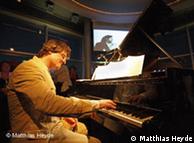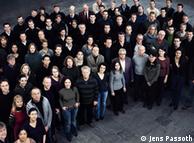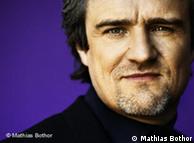Music | 13.01.2009
Conductor Ingo Metzmacher Aims to Uncover "German Soul"
Ingo Metzmacher, principal conductor of the German Symphony Orchestra Berlin (DSO), says music is closely linked to the German soul. His aim is to translate music for his audiences.
DW-WORLD.DE: Mr. Metzmacher, the history of DSO (Deutsches Symphonieorchester Berlin) is closely linked to Germany's history. However, you are the orchestra's first German principal conductor. Does that fact have special meaning to you?
Ingo Metzmacher: Actually the orchestra was founded by the Americans just after the war in 1946-47. It's also interesting to know that it's linked to the time just after the war when the Americans, English, French and Russians really tried to give Germany a chance to rebuild. They founded this orchestra for their radio station.
For me, the orchestra represents the newborn Germany after the Second World War. They've had a wonderful line of chief conductors since then, but I'm the first German. I've lived for maybe ten years in Belgium and Holland, so I think I also have a European or international background. I feel very German, but within Europe and within the world.
Do you think the orchestra's unique history has an impact on its role today?
 Bildunterschrift: Großansicht des Bildes mit der Bildunterschrift: Metzmacher is also active as a pianist
Bildunterschrift: Großansicht des Bildes mit der Bildunterschrift: Metzmacher is also active as a pianist
It should have a more important role. It's called the German Symphony Orchestra Berlin, so I would like for it to be even more representative of the country and its culture. Also, we have more than 20 nationalities in the orchestra. It really represents the international Germany that we have today -- especially in Berlin. There's been a big change in Germany and I think that this very young orchestra can show that to the world.
This is your second season with DSO. What are your goals for your time with the orchestra?
I would like to strengthen the role I just described and, on the other hand, I would like to maintain the very high quality of playing. During my time here, I have a project in mind -- to look after the "German soul" in music. That means: I'm interested in the special relationship of the German culture to music. Major composers were born in the German-speaking world. When you look at Germany, with all its theaters and orchestras, its cultural landscape is unique in the world. I think it represents the deep roots, which we have as Germans, of music and theater.
I think part of the reason is Germany's geographical position in the middle of Europe. It's always been confronted by influences from all sides. And the culture was always able to adopt the good parts of what came into the country. You can see that, during the time when Germany decided not to take in anything from outside but just to concentrate on the German roots, it completely failed. It was a disaster. I think the richness of the German culture is due to the fact that it always took in what came from outside.
You're known for your interest in modern and contemporary music. How did this interest develop?
It came when I was maybe 20 years old. I discovered the world of modern music for me. I come from a very traditional, Classical/Romantic background. My father was a musician and, for him, music was a kind of holy world. I didn't believe so much in that when I grew up. And it was very interesting for me to discover that there was a modern world of music -- starting, actually, in 1909. Since then, music for me has been a wide open field which I've tried to discover for myself.
How do you convey that to audiences?
I've written a book; I've done hundreds of introductions before concerts; I sometimes speak openly on the stage; I do these Casual Concerts in Berlin where I explain music to people. After all, I don't think it's so difficult to explain music. I think you just have to find the right words to describe what's really happening. You have to find a way to translate it. That's something that interests me a lot -- trying to translate my understanding of music into a language with words. That’s not easy because when you listen to the music you should forget the words again and try to understand the language that has no words.
 Bildunterschrift: The Deutsches Symphonieorchester
Bildunterschrift: The Deutsches Symphonieorchester
As you mentioned, you've lived in several countries. Where do you feel at home?
I've started to feel at home in Berlin. I always thought I would, but it took me longer than I thought. My head told me Berlin was the place I always wanted to be. Since I was young, I have longed for a German capital, which we didn’t have at the time. When I was in London or Paris I thought, what a pity that Germany doesn't have one like that -- a real big city where everything comes together. Since reunification, I think Berlin is growing into a major international capital. So I was very thrilled to come here. But it's also not easy here. It takes time to get used to it.
What's not easy about Berlin?
It's tough, especially in my field of music. We have seven orchestras in this city; we have three operas; we have the Berlin Philharmonic as a major player -- not only in Germany but in the world. It's tough to find your audience, to create your own profile, and to convince the politicians they should give you the money you need.
How does the DSO try to create its own profile?
We are the only orchestra in town that has a theme. We have the German soul. We have 1909. We have a programmatic plan -- that music has more to say than only to be beautiful. I strongly believe in the content of music, although it has no words. And I want to show that.
Click on the audio link below to hear Ingo Metzmacher discuss the series "Who's Afraid of 20th Century Music?" which he organized from 1999 to 2004 in Hamburg, and what made it so successful.


No comments:
Post a Comment